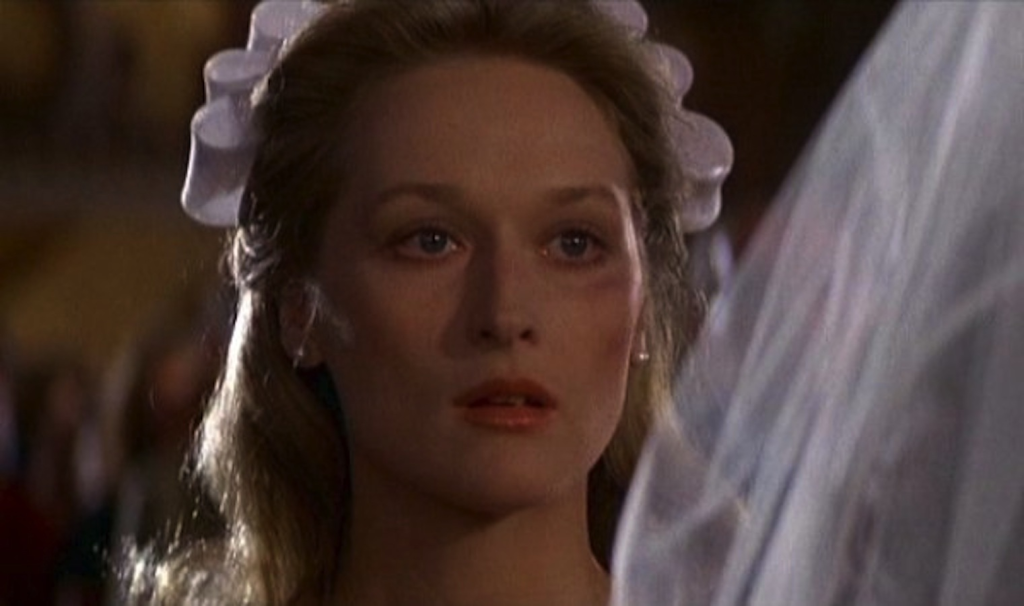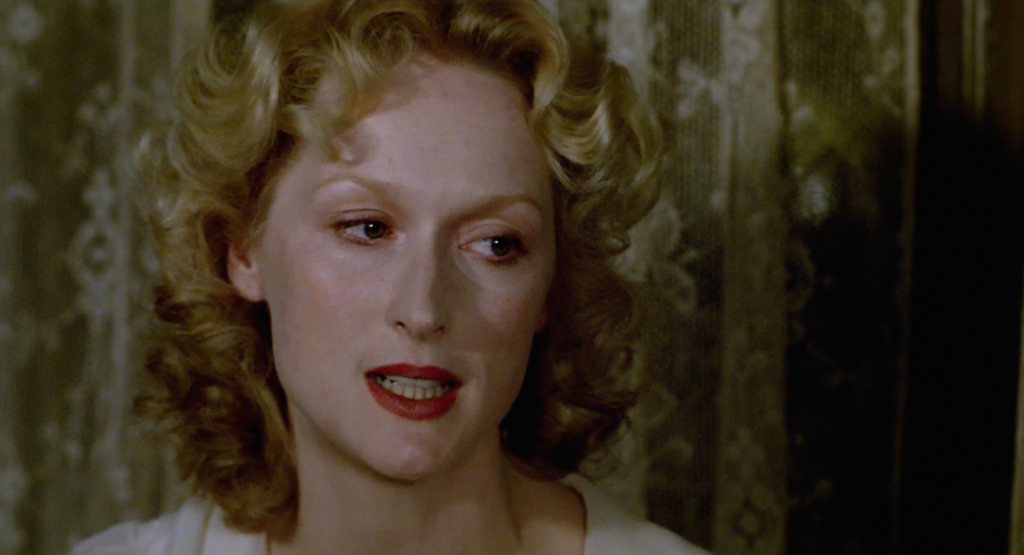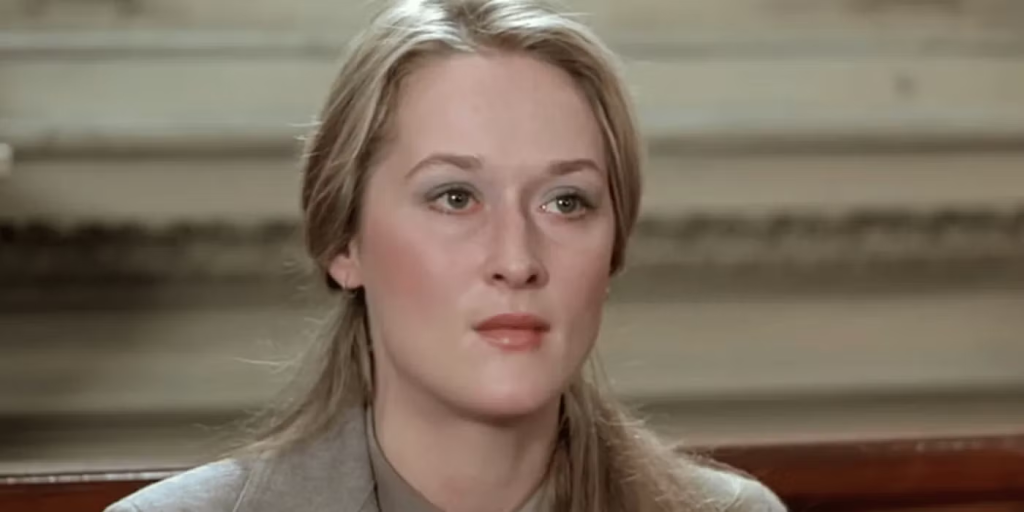Meryl Streep turns 76 today, June 22nd, an occasion that perhaps inevitably, prompts the annual, almost liturgical, coronation of our ‘Greatest Living Actress.’ At this point, the title feels less like an opinion and more like an established scientific fact.

Yet, I must begin this celebration with a critical confession, one that comes with the risk that I may be required to hand in my Cinephile badge. For all my profound, genuine respect for her skill, I have always admired Meryl Streep’s work more than I have loved it. For me, there has felt like a pane of invisible glass between her performances and my heart. Naturally, I have always assumed that the fault is mine, that I am missing some crucial aspect of her brilliance.
This essay, then, is an investigation into that feeling. Is this ‘genius gap’ the very signature of a singular artist, a deliberate choice to command our admiration over our affection? Or is it a reflection of the gendered double standard we apply to our female stars, demanding a ‘warmth’ we don’t expect from her brooding male peers? This is my attempt to deconstruct that paradox, to finally put a finger on the magnificent, and for me, occasionally remote, nature of her genius.
A Star Without a Persona
My investigation begins with what makes her different, and the first clue lies in what isn’t there. Unlike her celebrated contemporaries of the 1970s, there is no fixed ‘Streep’ persona to latch onto. Jane Fonda was the fiery activist, Diane Keaton the intellectual, quirky style icon. They were (and remain) outstanding performers whose work demands our attention but our connection is to their personalities as much as their performances.
However, Meryl Streep, from the very beginning, was something else. Even before making her film debut, she had a reputation on the stage as one of the finest actors of her generation. However, her first act of defiance against the machinery of Hollywood stardom was to refuse to be a type. Her persona, in effect, is her brilliance, a quality that stands in for the identifiable personal traits that anchor other stars. Her currency, unusually for a leading lady then or now, was never her sexuality or relatability, but her formidable skill.

This placed her in direct conversation not with other actresses who started their work in the 70s, but with the ‘method men’ of New Hollywood. However, even here Streep’s approach is distinct. In films like The Deer Hunter (1978), she held the screen with Robert De Niro and her then-partner John Cazale, matching their intensity not with mimicry, but with a different kind of finely calibrated truth. Her Yale-honed technique, meticulous, architectural, built from the outside-in was a stark contrast to their raw, immersive style. She arrived fully formed, a character actress in a leading lady’s body, signaling that her career would be a gallery of distinct constructions, not variations on a theme.
The “Genius Gap”: A Question of Misogyny?
As I dug deeper, I realized my feeling of distance was, to my relief, not unique; this sense that we are watching a technically accomplished but possibly emotionally distant performance, was most pointedly articulated by Pauline Kael, in particular in her reviews of Sophie’s Choice (1982) and the French Lieutenant’s Woman (1981), where she suggests that Streep might be more interested in presenting artistic truth, instead of embodying it. I’m not sure that I would quite go that far, but it does go some way to helping me understand the distance I feel watching, particularly those early, emotionally demanding films of hers.
However, here, I am required to ask, do we demand an emotional accessibility from our leading women that we don’t from our most revered male actors? A brooding Pacino is ‘intense;’ a remote De Niro is ‘committed.’ A ‘technical’ Streep, however, is often labeled ‘cold.’ It is difficult not to see a gendered double standard at play, a discomfort with a female performer whose primary appeal is her visible, formidable intelligence.

Nowhere is this dynamic more apparent than in Sophie’s Choice (1982). It is a performance of such monumental, heartbreaking skill, the flawless accent, the haunted physicality, the weight of history in her eyes, that one watches in a state of profound awe. We admire the staggering accomplishment, but it’s an admiration that can feel different from the direct, empathetic transference of emotion. It’s a masterpiece that, by the very nature of its perfection, can hold you at an admirer’s distance.
The Performance of Power and the Charming Interpreter
Her portrayal of powerful women further complicates this relationship with the audience. Miranda Priestly in The Devil Wears Prada (2006) is a masterful construction of authority, built not on charm or seduction, but on intellect, will, and a voice that never needs to rise above a whisper. It is a performance that commands respect, even fear, but never begs for our love. And yet, the film is wonderfully accessible; in fact, in one of her more understated roles, I found Miranda Priestly to be my favorite Meryl Streep creation.
Here, I found another clue to the “genius gap”: the role of the co-star. I realized that the emotional distance is often bridged for us by a “charming interpreter.” These co-stars function as audience surrogates, performing the “love” for her character that we might be held back from feeling by her sheer technical brilliance. In Prada, Stanley Tucci’s Nigel is our witty, conspiratorial guide. He doesn’t just interpret Miranda; he adores her, and his warmth gives us permission to find the shielded humanity behind the flawless, formidable facade. The same is true of Kevin Kline’s raw, loving devotion in Sophie’s Choice. These male supporters don’t compete with her; they orbit her, reflecting her brilliance and translating her formidable nature into a language we can more easily connect with.

When she is locked in direct conflict with a peer, as with Dustin Hoffman in Kramer vs. Kramer (1979), the gap closes for another reason. The “acting as sport,” the raw, reactive energy of the competition itself, becomes the source of a thrilling and deeply human immediacy. It seems her genius is most accessible either when translated by a devoted proxy or when sharpened against an equal blade.
The Unparalleled Architect
Whilst I can’t say that the gap is entirely closed for me, I now have a richer and more settled respect for her as a performer. Her career is singular. She has achieved a level of consistent brilliance that perhaps no other actor in Hollywood history has ever managed. The very fact that, as this journey has shown, there are no easy comparisons to be drawn between her and any of her contemporaries tells us something vital about her monumental impact.
In searching for any equivalent (male or female), I look past her generational peers, whose late-career relevance she has arguably surpassed, to Daniel Day-Lewis. He is the only other modern actor so obsessively committed to erasing persona for craft. But even this comparison fails to do her justice. Day-Lewis’s genius required him to operate outside the system, with years between each monumental effort. Meryl Streep’s genius was to achieve a similar level of architectural perfection while working with relentless, prolific consistency within it. If Day-Lewis’s genius is artisanal, requiring years of seclusion to hand-craft each singular performance, Streep’s is something else entirely: a feat of sustained, industrial-scale brilliance. She mastered the art of delivering singular creations from within the relentless machinery of Hollywood, a feat which is arguably the more impressive achievement.
And what of her legacy? As she marks her 76th birthday, the mantle of ‘greatest living actress’ is not one she will relinquish any time soon, but one can see her influence in the generation that followed. It lives in the chameleonic audacity of Cate Blanchett, the technical and emotional depth of Kate Winslet, and the consistent, empathetic excellence of Amy Adams. They are all brilliant performers who, in their own ways, carry forward the ethos of a career built on demonstrable skill.
The ‘gap’ I once felt, I now understand, is not a bug but a feature: the respectful distance required to admire a singular, magnificent structure. Her career is the masterpiece, a defiant gallery of brilliant women who demanded not our affection, but something far more valuable: our undivided attention.





